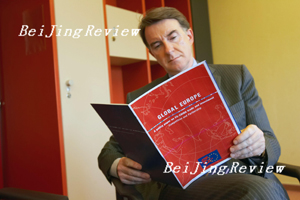
Fairness and mutual responsibility are likely to become key notions in China-European Union (EU) relations, experts say. In a recently released policy paper on China, the sixth the European Commission has adopted since 1995, "fair" and "responsibility" are the words that claimed the most attention from Chinese analysts.
According to Feng Zhongping, Director of the Institute of European Studies at the China Institutes of Contemporary International Relations (CICIR), the two words, which are repeatedly used in the paper, will appear increasingly frequently in future discussions of China-EU relations, especially their economic and trade relations.
The European Commission unveiled the policy paper, "EU-China: Closer Partners, Growing Responsibilities," on October 24 to indicate a new agenda for bilateral relations in the years to come. The initiative takes a comprehensive approach, identifying a wide range of priorities, from support for China's transition to a more open and plural society to sustainable development, and from trade and economic relations to the EU's position on Taiwan. It is accompanied by a trade policy paper setting out the challenges of bilateral trade and investment relations in more detail, the first ever accompanying paper that has been adopted.
While highlighting China's "revival," the policy paper underlines the importance of fair competition and China's responsibilities as a global economic and political power. Full recognition of China's strength and the great value put on an open Chinese market are distinguishing features of this new policy paper, analysts say.
Due recognition
Serge Abou, the EU's Ambassador to China, said the new policy paper mainly delivers three messages. First, China's development is a globalization success story instead of a threat. The EU benefits from China's development, and China's robust and stable economic growth serves the interests of the EU. Second, with China's rapid development come growing expectations. Third, Europe has to accept the fierce competition while China has to ensure it is fair competition by such means as cracking down on counterfeit goods.
Abou said China has reemerged as a major power in the last decade. It has not only become the world's fourth largest economy and third largest exporter, but also turned itself into an increasingly important political power. As China's development will have a profound impact on global politics and trade, the EU must improve policy coordination at all levels to ensure a focused single European voice on key issues, he added.
"China has reached the proper point in its development when it is legitimate to insist that it fulfill all its WTO [World Trade Organization] obligations, that it trades fairly, opens its markets and gives foreign companies fair treatment when they trade and invest here," Abou said.
According to the ambassador, the paper is a not definitive one, as it has yet to be approved by the EU Council. However, he said since they have had a lot of discussions while formulating the paper, member states are unlikely to introduce drastic changes in the upcoming debate. The final paper is expected to come out in January next year.
"Our new China initiative represents an ambitious agenda," Benita Ferrero-Waldner, EU Commissioner for External Relations and Neighborhood Policy, is quoted as saying in an EU press release. "To tackle the key challenges facing Europe today-like climate change, economic growth, migration and international security-we need to leverage the potential of a dynamic relationship with China. Today's communication offers an important backdrop to negotiations for a new EU-China framework agreement, which I will launch in China early in the new year."
The China-EU Summit in Helsinki, Finland, in September agreed to launch negotiations on a comprehensive new Partnership and Cooperation Agreement to upgrade the one in existence since 1985. Ferrero-Waldner will formally launch the negotiations during a visit to China early next year.
Chinese experts generally welcomed the EU's positive recognition of China. Hu Dawei, a scholar of European studies at the China Institute of International Studies (CIIS), said China's revival is a fact-based judgment and a reflection of the international community's impressions of China's development. China's growing national strength as well as its rising international status are changing the foundation of China-EU relations and affecting the EU's policy toward China, according to the scholar.
Hu continued that the EU has increasingly acknowledged China's constructive role on the international stage, as many pressing global concerns such as ensuring secure energy supplies, combating climate change and offering assistance to Africa are addressed in the policy paper.
However, differences in ideology persist, Hu said, adding that the promotion of "common values," a strategy that holds a prominent place in the policy paper, has been a long-standing policy of the EU.
Mei Xinyu, an expert with the Chinese Academy of International Trade and Economic Cooperation under the Ministry of Commerce, commented that in the field of human rights, the EU is mainly concerned about problems regarding labor rights, gender equality and prison conditions, issues that are more acceptable to China.
Asked for the Chinese Government's comments on the new EU strategy paper in a recent press conference, Foreign Ministry Spokesman Liu Jianchao said China was studying the paper carefully. At the same time, he said that China appreciates the positive effort by the EU to strengthen China-EU relations. Under the current international situation, strengthening the China-EU partnership and deepening cooperation serve the fundamental interests of both sides and are conducive to peace, stability and development of the world, he added.
Vested interests
Feng of the CICIR explained what the EU meant by fairness and responsibility. He argued that advocating fairness speaks of the EU's concern over its huge trade deficit with China. According to him, the deficit with China represents over 90 percent of the EU's total trade deficit. Also, the emphasis on fairness has much to do with market access, as the EU questions whether the Chinese market is as open as its own.
The reason why the EU has underscored responsibility is that in its eyes, China is not taking enough responsibility for widespread intellectual property rights violations.
Echoing Feng's ideas, Zhao Junjie, a research fellow at the Institute of European Studies, China Academy of Social Sciences, further noted that the EU stresses fairness because it wants China to shoulder more responsibilities. He pointed out that the EU seems to assume that given its rapid economic growth, China should no longer be regarded as a developing country but is coming closer to the developed world, a trend that he believes deserves China's attention.
Mei told Beijing Review that the responsibilities China is expected to shoulder would correspond to the fact that China is a developing country. He said it is his hope that its trading partners would bear this in mind when negotiating with China.
Mei warned that opening the market can bring risks as well as opportunities. China should not make a commitment to further opening its market before it prepares itself for the potential risks, he said. For example, the EU has been urging China to open its government procurement market. While affirming that China should gradually open the procurement market, Mei noted that the government is not expected to seek openness at the risk of breeding corruption, since commercial bribery, a serious problem in China's foreign trade, has yet to be effectively curbed.
Hu of the CIIS argued that the EU's demand for openness is not fair for China. He said the Chinese market is already highly open, as foreign investment accounts for a large proportion of the Chinese economy. He asserted that the reason why the EU feels the Chinese market is not accessible enough is that European investors are not as competitive as their counterparts from other parts of the world.
In recent years, especially since China's accession to the WTO in 2001, China-EU trade relations have become tighter than ever. The EU has surpassed the United States to become China's largest trading partner, whereas China is the EU's second largest trading partner. In light of the intricacy and complexity of the relationship, experts warn that trade frictions between China and Europe are set to increase.
Hu said the methods of addressing disputes stated in the policy paper are reasonable. According to the paper, the EU will first seek to resolve trade irritants with China through dialogue and negotiation. However, it will resort to the WTO dispute settlement system "where other efforts have failed." Hu commented that instead of politicizing trade issues, these procedures are normal in settling trade disputes.
Feng said the EU should step up its economic restructuring to scrap the labor-intensive sector of the economy, a move that he identified as a key to the sound development of China-EU relations. China, for its part, needs to expand domestic consumption instead of relying too much on the European market, according to the expert.
Zhao said increasing hi-tech exports to China and lifting the arms embargo would also help to establish fair relations between China and Europe and eliminate Europe's trade deficit.
Interviewed by China News Service shortly after the release of the policy paper, China's Commerce Minister Bo Xilai stressed that the Chinese and European economies are highly complementary. Despite the trade disputes, he said he believes that the trade between China and Europe will become even larger in volume and more satisfying.
At the same time, Bo said he hopes the EU upholds the principle of free trade while trading with China. "China will honor all its WTO commitments," he said. "Although it may be difficult to do so, it is determined to overcome the difficulties. China's efforts to honor its commitments have received positive comments from most WTO members."
| 